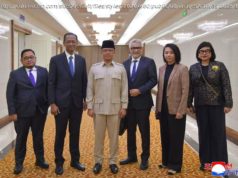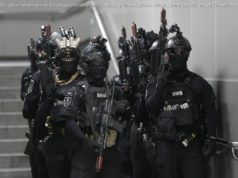The Latest on tensions on the Korean Peninsula (all times local) :
SEOUL, South Korea (AP) – The Latest on tensions on the Korean Peninsula (all times local) :
7: 15 a.m.
Mexico’s government is expelling the ambassador of North Korea in response to Pyongyang’s latest nuclear test.
The Foreign Relations Department said ambassador Kin Hyon Gil was declared persona non-grata and ordered him to leave the country within 72 hours.
“With this diplomatic action, Mexico expresses to the North Korean government its absolute rejection of its recent nuclear activity, ” the department said on a press release.
North Korea conducted on Sunday its strongest nuclear test explosion yet.
___
6: 44 a.m.
United Nations diplomats say China’s U. N. ambassador is flying back from Ethiopia for negotiations on new U. N. sanctions against North Korea, and the United States is still planning for a vote Monday.
China’s envoy, Liu Jieyi, was on a U. N. Security Council visit to Ethiopia.
The council isn’t due back at U. N. headquarters until Monday. But the diplomats said Thursday that consultations on the U. S.-drafted sanctions resolution are taking place among the 15 members in New York and other world capitals.
The proposed resolution would ban all oil and natural gas exports to North Korea and freeze the assets of the government and its leader Kim Jong Un. It would also ban textile exports and prohibit North Koreans from working overseas.
Britain’s U. N. Ambassador Matthew Rycroft said Thursday that robust new sanctions targeting oil, textiles and overseas workers that help fund North Korea’s nuclear and missile programs are essential to put “maximum possible pressure” on its government to change course and give diplomacy a chance to end the crisis.
The diplomats, speaking on condition of anonymity because consultations have been private, said they expect some provisions in the draft resolution to be watered down in negotiations.
–Associated Press writer Edith M. Lederer
___
5: 05 a.m.
A senior Trump administration official says the U. S. is still assessing North Korea’s latest nuclear test but so far notes nothing inconsistent with Pyongyang’s claim it was a hydrogen bomb.
The official adds, however, that the U. S. has yet to establish a conclusive view on last weekend’s underground explosion, which independent experts have said was the North’s most powerful yet.
The official was briefing reporters on condition of anonymity under ground rules set by the administration.
A hydrogen bomb would mark a stunning advance in the North’s demonstrated ability to build high-yield nuclear weapons. More formally called thermonuclear devices, H-bombs have the potential to be far stronger than simpler fission bombs like those used on Hiroshima and Nagasaki by the United States at the end of World War II.
– By Matthew Pennington
____
3: 57 a.m.
U. S. President Donald Trump says North Korea “is behaving badly and it’s got to stop.”
Trump says military action is an option against a nuclear-armed North Korea, but “nothing is inevitable.”
He says he would prefer not to go the military route, but he says it could happen – and if it did, it would be “a very sad day for North Korea.”
Trump was speaking at a White House news conference after meeting the leader of Kuwait.
Over the weekend, North Korea conducted its strongest nuclear test explosion yet, deepening concerns about advance in its weapons development.
___
9 p.m.
German Chancellor Angela Merkel and Chinese President Xi Jinping have called for tougher sanctions against North Korea following its latest nuclear test.
Her spokesman, Steffen Seibert, says Merkel spoke by phone Thursday with Xi and both expressed great concern about the situation in North Korea.
He said both leaders advocated tougher sanctions against North Korea, but agreed that dialogue must continue to find a peaceful solution to the crisis.
China’s state broadcaster, China Central Television, said Xi told Merkel that China remains committed to the denuclearization of the Korean Peninsula and to the region’s peace and stability.
Xi said: “Facts have repeatedly proven that the Korean Peninsula issue can only be resolved through peaceful means, including dialogue and consultation. This requires the international community to work together.”
North Korea conducted its sixth and most powerful nuclear test last Sunday.
___
6 p.m.
South Korea has warned its citizens in China to avoid “friction” and “needless arguments” with Chinese people after the U. S. military added more launchers to a contentious missile defense system in South Korea that Beijing opposes.
Seoul’s Foreign Ministry spokesman Cho June-hyuck said Thursday that the message posted on the website of the South Korean Embassy in Beijing was aimed at protecting the safety of South Koreans in China.
Washington and Seoul say the Terminal High-Altitude Area Defense system allows South Korea and U. S. troops stationed in the country to better cope with the threat of North Korean missiles.
China has expressed anger over the deployment, saying that the system’s powerful radar can be potentially used to peer deep into its territory and monitor its flights and missile launches.
South Korea has previously raised concerns over a reported ban on Chinese tour groups visiting the country in what many saw as Beijing’s retaliation over the THAAD deployment.
There have also been reports in past months about growing calls in China to boycott South Korean products and cancel appearances by South Korean pop singers or movie stars.
___
5: 45 p.m.
NATO’s secretary-general says North Korean behavior is a global threat and is calling for a united response.
Jens Stoltenberg says North Korea must abandon its nuclear and missile programs and refrain from further testing.
His comments in the Estonian capital Thursday follow Pyongyang’s latest and the most powerful test explosion Sunday of what it says was a thermonuclear weapon built for missiles capable of reaching the U. S. mainland.
The European Union’s foreign policy chief, also speaking in Tallinn, says the world should not “enter this spiral of a military confrontation that could be extremely dangerous not only for the region but for the entire world.






